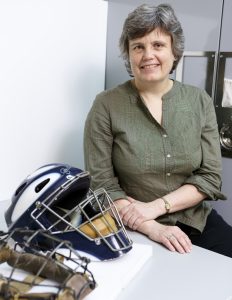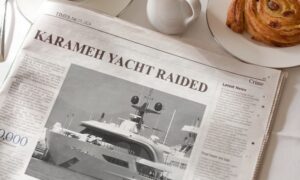This post is reprinted from “Baseball Nation: Still Indivisible,” the July–August 2018 issue of LCM, the Library of Congress Magazine. Issues of the magazine are available online.
Susan Reyburn. Photo by Shawn Miller.
Susan Reyburn of the Library’s Publishing Office writes and edits books that help make Library collections more accessible to the public. Over the years, she’s worked on book projects related to football, World War II and the Magna Carta.
In 2009, Reyburn co-authored “Baseball Americana,” a volume exploring baseball treasures in the Library’s collections. Now, she is serving as curator of a major new exhibition of the same name, which opened at the Library on June 29.
Here, Reyburn talks about her work and the Library’s baseball collections.
How would you describe your work at the Library?
It’s always interesting and at times eclectic. In the Publishing Office, we produce books and other products, such as calendars and quiz decks, based on the Library’s collections. Our role is to help make the collections more accessible to the public through what we publish.
With 167 million or so items here, we have no shortage of topics to consider or resources to explore each year. So, we excavate, research, write, edit and meet with Library subject experts on a variety of things.
How did you prepare for your position?
For this job, having a background in history has been really helpful. I have a bachelor’s in history and did a master’s program in library science, specializing in cultural-heritage management. After working in private industry – editing and preparing economic and environmental-impact reports – I did the publication-specialist certificate program at George Washington University in a single, crazed summer.
We covered a lot of territory, and it was ideal preparation for working in our small office at the Library, where we each wear multiple hats – sometimes even stacked up.
What book projects have you especially enjoyed?
Our books on baseball and football were great fun; I knew we had a lot sports material here, but just how much and the variety was a revelation. “The Library of Congress World War II Companion” was a huge collaborative and endlessly fascinating effort, and it was great to go through the original first-person accounts of servicemen and women in the Veterans History Project. We also interviewed veterans, including some who had not discussed their wartime experiences much before, and a marvelous woman who had been a WASP (in the Women Airforce Service Pilots). Those interviews are now in the VHP collections.
And I loved researching the history of Magna Carta’s adventures and its unexpectedly lengthy residency at the Library during World War II – with two of those years in hiding at Fort Knox – for a chapter in a book that accompanied the “Magna Carta: Muse and Mentor” exhibition.
I’ve also enjoyed working with Library curators and experts on their books, because they are passionate and enthusiastic about their subjects, and they know more about them than we can ever put in the book.
What are your favorite baseball items in the Library’s collections and why?
I am so taken by “A Little Pretty Pocket Book” (first American edition, 1787). This aptly named tome, only a few inches in length, appears in the “Baseball Americana” exhibition. It contains the first known printed reference to baseball in America and includes a woodcut drawing that shows wooden posts being used as bases.
This is baseball as a folk game, exactly a century before professional teams would pose in carpeted photography studios with balls hanging by string from the ceiling for the first sets of baseball cards in 1887.
The early baseball cards and early rule books are wonderful examples of a game that is definitely recognizable but is still coming into its own as a major sport.

















